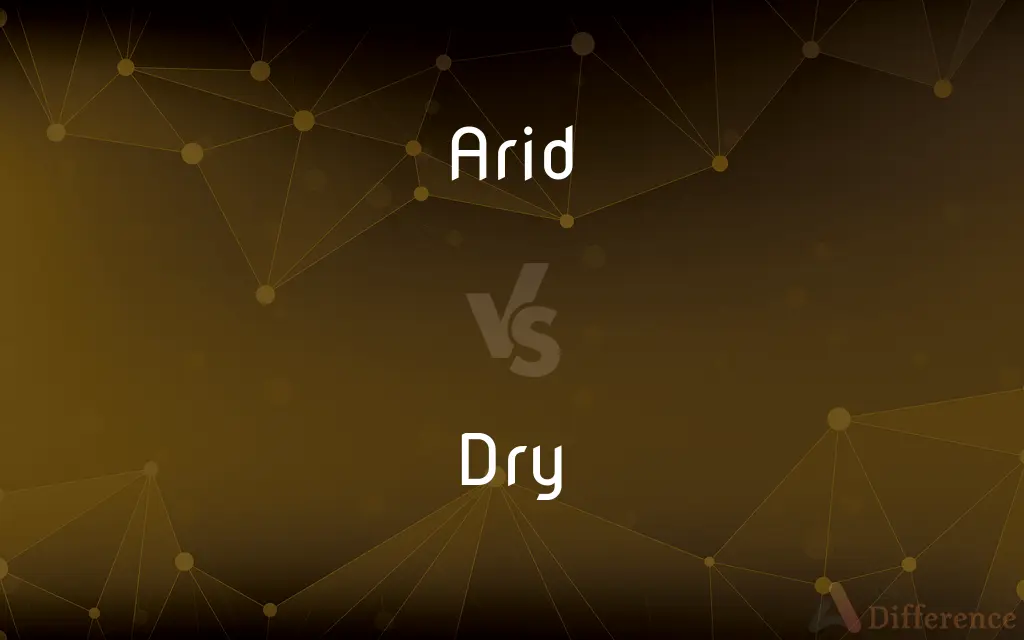Arid vs. Dry — What's the Difference?
By Fiza Rafique & Maham Liaqat — Updated on March 18, 2024
Arid regions experience extremely low precipitation, making them deserts, whereas dry areas have a lack of moisture but can still support life.

Difference Between Arid and Dry
Table of Contents
ADVERTISEMENT
Key Differences
Arid environments are characterized by extreme dryness, often receiving less than 250 millimeters (10 inches) of precipitation annually, which severely limits the types of vegetation and animal life that can survive there. Dry areas, while also lacking in moisture, generally receive more precipitation than arid regions and can support a broader range of life forms.
The term "arid" is often used to describe climates where the lack of rainfall makes it nearly impossible for large-scale agriculture without irrigation. In contrast, dry areas might still support certain types of farming, especially those adapted to conditions with low water availability, indicating a less severe level of dryness.
Arid zones, such as deserts, have specific adaptations in flora and fauna to cope with the extreme conditions, like cacti's water storage mechanisms or nocturnal animals to avoid daytime heat. Dry areas may not be as extreme, allowing for more diverse ecosystems, including grasslands and scrublands, where organisms have adapted to conserve water but not to the extent seen in arid environments.
The soil in arid regions is often sandy and lacks organic materials, making it unsuitable for most types of agriculture. In dry areas, the soil can vary more widely but generally contains more nutrients and organic matter than in arid zones, making it more conducive to plant life.
Despite their differences, both arid and dry climates face challenges related to water scarcity. Conservation efforts in these areas focus on sustainable water use, protecting vulnerable ecosystems, and adapting human activities to the limitations imposed by low moisture levels.
ADVERTISEMENT
Comparison Chart
Precipitation
< 250 mm/year
Higher than arid, but still low
Agriculture
Limited to non-existent without irrigation
Possible with drought-resistant crops
Flora and Fauna
Highly specialized for extreme conditions
Diverse, but adapted to conserve water
Soil Composition
Sandy, low in organic materials
More nutrients and organic matter than arid soils
Ecosystems
Deserts with sparse vegetation
Grasslands, scrublands with more vegetation
Compare with Definitions
Arid
Supports ecosystems with specially adapted life forms.
In arid regions, many plants have deep root systems to access groundwater.
Dry
Lacks moisture but receives more precipitation than arid areas.
The dry climate was tough on crops, but some rain still fell each year.
Arid
Characterized by extreme dryness and very low rainfall.
The arid landscape stretched for miles without a single tree.
Dry
Can support a wider range of plant and animal life.
Dry regions are often home to grasslands and shrubby vegetation.
Arid
Often synonymous with desert environments.
The Sahara is one of the most well-known arid regions on Earth.
Dry
Not as extreme as arid zones, allowing for more agricultural opportunities.
Dry farming techniques are essential in these regions for growing crops.
Arid
Challenges include severe water scarcity and soil erosion.
Arid areas face significant threats from desertification.
Dry
Soil may be more fertile than in arid landscapes.
The dry area's soil, enriched by occasional rains, supported a variety of plants.
Arid
Requires innovative water management for habitation and agriculture.
Ancient civilizations in arid regions developed extensive irrigation systems.
Dry
Water conservation remains a critical concern.
Water-saving practices are vital for sustaining life in dry climates.
Arid
A region is arid when it is characterized by a severe lack of available water, to the extent of hindering or preventing the growth and development of plant and animal life. Environments subject to arid climates tend to lack vegetation and are called xeric or desertic.
Dry
Free from moisture or liquid; not wet or moist
He wiped the table dry with his shirt
The jacket kept me warm and dry
Arid
Lacking moisture, especially having insufficient rainfall to support trees or woody plants
An arid climate.
Dry
(of information, writing, etc.) dully factual
The dry facts of the matter
Arid
Lacking interest or feeling; lifeless and dull
A technically perfect but arid musical performance.
Dry
(of a joke or sense of humour) subtle and expressed in a matter-of-fact way
He delighted his friends with a dry, covert sense of humour
Arid
Very dry.
The cake was arid.
Dry
Prohibiting the sale or consumption of alcoholic drink
The country is strictly dry, in accordance with Islamic law
Arid
Describing a very dry climate. Typically defined as less than 25 cm or 10 inches of rainfall annually.
Deserts are known for being arid.
Dry
(of an alcoholic drink) not sweet
A dry, medium-bodied red wine
Arid
(figurative) Devoid of value.
The millionaire viewed his gift as arid.
Dry
Relating to political ‘dries’; rigidly monetarist.
Arid
Exhausted of moisture; parched with heat; dry; barren.
Dry
Become dry
Waiting for the paint to dry
Pools are left as the rivers dry up
Do not let the soil dry out
Arid
Lacking sufficient water or rainfall;
An arid climate
A waterless well
Miles of waterless country to cross
Dry
Forget one's lines
A colleague of mine once dried in the middle of a scene
Arid
Lacking vitality or spirit; lifeless;
A technically perfect but arid performance of the sonata
A desiccate romance
A prissy and emotionless creature...settles into a mold of desiccated snobbery
Dry
The process or an instance of drying.
Dry
A dry or covered place.
Dry
A Conservative politician (especially in the 1980s) in favour of strict monetarist policies.
Dry
A person in favour of the prohibition of alcohol
Evangelical dries had seen to it that the nearest bottle of whiskey was miles away
Dry
Free from liquid or moisture
Changed to dry clothes.
Dry
Having or characterized by little or no rain
A dry climate.
Dry
Marked by the absence of natural or normal moisture
A dry month.
Dry
Not under water
Dry land.
Dry
Having all the water or liquid drained away, evaporated, or exhausted
A dry river.
Dry
No longer yielding liquid, especially milk
A dry cow.
Dry
Not producing a liquid substance that is normally produced
Dry heaves.
Dry
Not shedding tears
Dry sobs.
Dry
Needing moisture or drink
A dry mouth.
Dry
No longer wet
The paint is dry.
Dry
Of or relating to solid rather than liquid substances or commodities
Dry weight.
Dry
Not sweet as a result of the decomposition of sugar during fermentation. Used of wines.
Dry
Having a large proportion of strong liquor to other ingredients
A dry martini.
Dry
Eaten or served without butter, gravy, or other garnish
Dry toast.
Dry meat.
Dry
Having no adornment or coloration; plain
The dry facts.
Dry
Devoid of bias or personal concern
Presented a dry critique.
Dry
Lacking tenderness, warmth, or involvement; severe
The actor gave a dry reading of the lines.
Dry
Matter-of-fact or indifferent in manner
Rattled off the facts in a dry mechanical tone.
Dry
Wearisome; dull
A dry lecture filled with trivial details.
Dry
Humorous in an understated or unemotional way
Dry wit.
Dry
Prohibiting or opposed to the sale or consumption of alcoholic beverages
A dry county.
Dry
Unproductive of the expected results
A mind dry of new ideas.
Dry
Constructed without mortar or cement
Dry masonry.
Dry
To remove the moisture from; make dry
Laundry dried by the sun.
Dry
To preserve (meat or other foods, for example) by extracting the moisture.
Dry
To become dry
The sheets dried quickly in the sun.
Dry
A prohibitionist.
Dry
Free from or lacking moisture.
This towel's dry. Could you wet it and cover the chicken so it doesn't go dry as it cooks?
Dry
Unable to produce a liquid, as water, (petrochemistry) oil, or (farming) milk.
This well is as dry as that cow.
Dry
(masonry) Built without or lacking mortar.
Dry
(chemistry) Anhydrous: free from or lacking water in any state, regardless of the presence of other liquids.
Dry alcohol is 200 proof.
Dry
(figurative) Athirst, eager.
Dry
Free from or lacking alcohol or alcoholic beverages.
Of course it's a dry house. He was an alcoholic but he's been dry for almost a year now.
Dry
(law) Describing an area where sales of alcoholic or strong alcoholic beverages are banned.
You'll have to drive out of this dry county to find any liquor.
Dry
Free from or lacking embellishment or sweetness, particularly:
Dry
Low in sugar; lacking sugar; unsweetened.
Proper martinis are made with London dry gin and dry vermouth.
Dry
(humor) Amusing without showing amusement.
Steven Wright has a deadpan delivery, Norm Macdonald has a dry sense of humor, and Oscar Wilde had a dry wit.
Dry
Lacking interest, boring.
A dry lecture may require the professor to bring a water gun in order to keep the students' attention.
Dry
(fine arts) Exhibiting precise execution lacking delicate contours or soft transitions of color.
Dry
(aviation) Not using afterburners or water injection for increased thrust.
This fighter jet's engine has a maximum dry thrust of 200 kilonewtons.
Dry
Involving computations rather than work with biological or chemical matter.
Dry
(of a sound recording) Free from applied audio effects (especially reverb).
Dry
Without a usual complement or consummation; impotent.
Never dry fire a bow
Dry humping her girlfriend
Making a dry run
Dry
Of a bite from an animal: not containing the usual venom.
Dry
(Christianity) Of a mass, service, or rite: involving neither consecration nor communion.
Dry
The process by which something is dried.
This towel is still damp: I think it needs another dry.
Dry
(US) A prohibitionist (of alcoholic beverages).
Dry
An area with little or no rain, or sheltered from it.
Come under my umbrella and keep in the dry.
Dry
The dry season.
Dry
(Australia) An area of waterless country.
Dry
Unsweetened ginger ale; dry ginger.
Dry
A radical or hard-line Conservative; especially, one who supported the policies of British Prime Minister Margaret Thatcher in the 1980s.
Dry
(intransitive) To lose moisture.
The clothes dried on the line.
Dry
(transitive) To remove moisture from.
Devin dried her eyes with a handkerchief.
Dry
To exhaust; to cause to run dry.
Dry
For an actor to forget his or her lines while performing.
Dry
Free from moisture; having little humidity or none; arid; not wet or moist; deficient in the natural or normal supply of moisture, as rain or fluid of any kind; - said especially: (a) Of the weather: Free from rain or mist.
The weather, we agreed, was too dry for the season.
Dry
Of vegetable matter: Free from juices or sap; not succulent; not green; as, dry wood or hay.
Give the dry fool drink.
Dry
Destitute of that which interests or amuses; barren; unembellished; jejune; plain.
These epistles will become less dry, more susceptible of ornament.
Dry
Of the eyes: Not shedding tears.
Not a dry eye was to be seen in the assembly.
Dry
Characterized by a quality somewhat severe, grave, or hard; hence, sharp; keen; shrewd; quaint; as, a dry tone or manner; dry wit.
He was rather a dry, shrewd kind of body.
Dry
Of certain morbid conditions, in which there is entire or comparative absence of moisture; as, dry gangrene; dry catarrh.
Dry
Exhibiting a sharp, frigid preciseness of execution, or the want of a delicate contour in form, and of easy transition in coloring.
The scientific man must keep his feelings under stern control, lest they obtrude into his researches, and color the dry light in which alone science desires to see its objects.
Dry
To make dry; to free from water, or from moisture of any kind, and by any means; to exsiccate; as, to dry the eyes; to dry one's tears; the wind dries the earth; to dry a wet cloth; to dry hay.
Their honorable men are famished, and their multitude dried up with thirst.
The water of the sea, which formerly covered it, was in time exhaled and dried up by the sun.
Their sources of revenue were dried up.
Dry
To grow dry; to become free from wetness, moisture, or juice; as, the road dries rapidly.
Dry
To evaporate wholly; to be exhaled; - said of moisture, or a liquid; - sometimes with up; as, the stream dries, or dries up.
Dry
To shrivel or wither; to lose vitality.
And his hand, which he put forth against him, dried up, so that he could not pull it in again to him.
Dry
A reformer who opposes the use of intoxicating beverages
Dry
Remove the moisture from and make dry;
Dry clothes
Dry hair
Dry
Become dry or drier;
The laundry dries in the sun
Dry
Free from liquid or moisture; lacking natural or normal moisture or depleted of water; or no longer wet;
Dry land
Dry clothes
A dry climate
Dry splintery boards
A dry river bed
The paint is dry
Dry
Humorously sarcastic or mocking;
Dry humor
An ironic remark often conveys an intended meaning obliquely
An ironic novel
An ironical smile
With a wry Scottish wit
Dry
Opposed to or prohibiting the production and sale of alcoholic beverages;
The dry vote led by preachers and bootleggers
A dry state
Dry
Not producing milk;
A dry cow
Dry
(of wines) not sweet because of decomposition of sugar during fermentation;
A dry white burgundy
Dry
Without a mucous or watery discharge;
A dry cough
That rare thing in the wintertime; a small child with a dry nose
Dry
Not shedding tears;
Dry sobs
With dry eyes
Dry
Lacking interest or stimulation; dull and lifeless;
A dry book
A dry lecture filled with trivial details
Dull and juiceless as only book knowledge can be when it is unrelated to...life
Dry
Used of solid substances in contrast with liquid ones;
Dry weight
Dry
Unproductive especially of the expected results;
A dry run
A mind dry of new ideas
Dry
Having no adornment or coloration;
Dry facts
Rattled off the facts in a dry mechanical manner
Dry
(of food) eaten without a spread or sauce or other garnish;
Dry toast
Dry meat
Dry
Suffering from fluid deprivation;
His mouth was dry
Dry
Having a large proportion of strong liquor;
A very dry martini is almost straight gin
Dry
Lacking warmth or emotional involvement;
A dry greeting
A dry reading of the lines
A dry critique
Dry
Practicing complete abstinence from alcoholic beverages;
He's been dry for ten years
No thank you; I happen to be teetotal
Common Curiosities
Can agriculture thrive in dry areas?
Yes, with the right techniques and crops adapted to low moisture, agriculture can be sustainable in dry areas.
Do dry regions have seasons?
Yes, dry regions can have seasons, but the variation in precipitation between them may be less pronounced than in wetter climates.
What adaptations do plants in arid regions have?
Plants in arid regions often have adaptations like deep root systems or water-storing structures to survive the harsh conditions.
How do animals in arid regions find water?
Animals in arid regions may get water from food, travel great distances to find water, or utilize dew and other minimal sources.
Are deserts always arid?
Yes, deserts are classified as arid regions due to their very low precipitation and extreme dryness.
Can dry regions support forests?
Dry regions might support sparse woodlands or forests, especially if they border on areas with higher moisture.
Are there cultural aspects unique to arid region inhabitants?
Yes, cultures in arid regions often have unique traditions and practices shaped by the challenges of living in such environments.
Is it possible to reverse desertification in arid areas?
Reversing desertification is challenging but possible with efforts like reforestation, soil management, and water conservation.
What qualifies a region as arid?
An arid region receives less than 250 millimeters of precipitation annually, creating extremely dry conditions.
What is the main difference between arid and dry climates?
The main difference is in the level of precipitation and the severity of the dryness, with arid climates being more extreme.
What are common water conservation techniques in dry areas?
Techniques include rainwater harvesting, drip irrigation, and the use of drought-resistant crops.
Can technology improve water availability in arid and dry areas?
Yes, technology like desalination, efficient irrigation, and water recycling can significantly improve water availability.
What is the impact of climate change on arid and dry regions?
Climate change can exacerbate water scarcity, leading to more severe droughts and expanding desertification.
How do urban areas in dry regions manage water?
Urban areas manage water through infrastructure for efficient use and distribution, often incorporating advanced conservation techniques.
How do people adapt to living in arid regions?
Adaptations include building homes that stay cool, managing water resources carefully, and relying on suitable agriculture.
Share Your Discovery

Previous Comparison
Career vs. Careen
Next Comparison
Catalysis vs. CatalystAuthor Spotlight
Written by
Fiza RafiqueFiza Rafique is a skilled content writer at AskDifference.com, where she meticulously refines and enhances written pieces. Drawing from her vast editorial expertise, Fiza ensures clarity, accuracy, and precision in every article. Passionate about language, she continually seeks to elevate the quality of content for readers worldwide.
Co-written by
Maham Liaqat













































